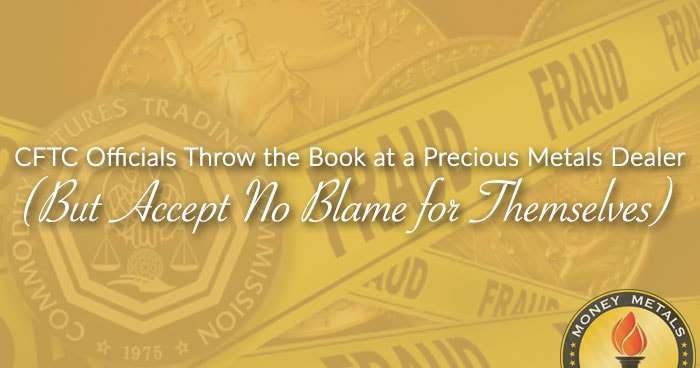CFTC News
The Commodity Futures Trading Commission (CFTC) filed suit against a precious metals dealer last week. The firm is accused of using high-pressure sales tactics while misleading investors about the risks associated with its debt-financed purchase program. Customers lost nearly $300 million since 2011 from leveraged transactions that the CFTC believes it has the authority to regulate.

The Commission appears to be seeking an expansion of its jurisdiction and wants an injunction that prevents this dealer from continuing to market its debt-leverage program. The CFTC is also asking the court to force the company to disgorge any illicit profits and provide client restitution.
This particular company has previously fended off regulatory action involving leveraged trading of precious metals and even received an explicit exemption from the CFTC decades ago. However, the CFTC believes that Dodd-Frank legislation passed in 2010 has expanded its power to intervene in this area.
Whether there is merit to the latest charges is unknown. But the CFTC appears to have a double standard.
If investors lose big money making leveraged bets outside the rigged futures markets, regulators seem inclined to act aggressively. If people lose a fortune trading with regulated bullion banks who have been shown to collude with each other to manipulate gold and silver prices, CFTC bureaucrats may spend years investigating but find little to no fault.
It is also worth noting that the CFTC blaming a dealer for client losses since 2011 isn’t telling the whole story. These losses can be blamed, at least in part, on the general carnage in gold and silver prices during that period. Silver fell from the high $40s to nearly $13 per ounce.
Investors globally betting on higher metals prices using leverage lost billions in recent years, not just millions. The volatility of the market and the potential for margin calls and outsized losses is one reason why we don’t advocate that individuals use any form of leverage to purchase precious metals. Taking such risks is the province of experienced professional traders.
The evidence of widespread cheating is plentiful and still piling up. The CFTC has so far failed in its charter responsibility to ensure fairness in these exchanges. Best that CFTC bureaucrats focus their attention on rooting out the illegal manipulation by large bullion banks operating on the COMEX, particularly since the COMEX is where global prices for monetary metals are still determined.

About the Author:
Clint Siegner is a Director at Money Metals Exchange, a precious metals dealer recently named "Best in the USA" by an independent global ratings group. A graduate of Linfield College in Oregon, Siegner puts his experience in business management along with his passion for personal liberty, limited government, and honest money into the development of Money Metals' brand and reach. This includes writing extensively on the bullion markets and their intersection with policy and world affairs.





